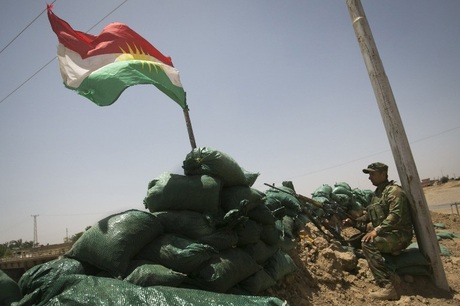Kurds Unite to Oust Iraq Jihadists, Rescue Stranded Civilians
إقرأ هذا الخبر بالعربية
Kurdish fighters from Iraq, Syria and Turkey joined forces in northern Iraq Wednesday in bid to reclaim areas lost to jihadists and rescue thousands of civilians stranded without food or water in nearby mountains.
The fate of the civilians, many of them from the Yazidi minority who fled to the Sinjar mountains after an attack by the Islamic State (IS) group at the weekend, has sparked international concern.
In a series of raids west and north of their main Iraqi hub of Mosul in recent days, IS fighters took over the towns of Sinjar and Zumar, further secured the border with Syria by seizing Rabia, and they bagged several oilfields in the process.
A senior official from Iraq's Patriotic Union of Kurdistan (PUK) party said Kurdish fighting units from the homegrown peshmerga, the Syrian-based PYD and the Turkish PKK had agreed to share responsibility for the ongoing counter-offensive.
"The fighters of West Kurdistan and the PKK are responsible for confronting Daash (IS's former Arabic acronym) in Rabia and the Sinjar area," said Hallo Penjweny, the PUK's top official for the Mosul region.
"On our side, we are taking care of Zumar and the rest of the area north and east of Mosul," he told reporters.
Sinjar is west of Mosul, Iraq's second city.
West Kurdistan refers to the Syrian Democratic Union Party (PYD), which claims it has already retaken Rabia but it remains unclear how much progress they have made in the Sinjar area.
Another PUK official warned it could be some time before the civilians can be rescued.
"The PKK is working to open a safe passage for the displaced; it is not easy and it will require days," Harem Kamal Agha told Agence France Presse.
Abu Abbas, a 50-year-old irrigation ministry employee who fled Sinjar to Kurdistan told AFP about the plight of his children and other relatives trapped in the barren Sinjar range.
"The biggest problem now is that they have no food. They have started hunting small animals in the mountains and they eat anything they can find," he said.
"Several children have died already and been buried in the mountain. All the women are giving their milk to the children, regardless of whether they are Yazidi, Muslim or Christian."
"The elders who know some old natural springs are searching the mountain but it's dangerous. On the other side, Daash is waiting for them. I think it will be difficult for any of them to survive longer than two or three more days," he said.
Abu Abbas said he had received scant information on Wednesday because his relatives' phone batteries had run out.
Iraqi government officials said 77 tonnes of food and water had been air-dropped since Tuesday.
The peshmerga are considered the most able military force in Iraq, but their regional government has been cash-strapped and they have struggled to hold the territory they grabbed when federal soldiers retreated in the face of an initial IS onslaught two months ago.
Their withdrawal from Sinjar after hours battling IS militants, left civilians running for their lives.
Notable among them are Yazidis, who are stigmatized as "devil-worshipers" by the jihadists because of their unique blend of beliefs and practices.
A Yazidi lawmaker broke down in tears during a parliamentary session Tuesday as she urged the government and the international community to save her people from being massacred or starved into extinction.
"We are being slaughtered; our entire religion is being wiped off the face of the earth. I am begging you, in the name of humanity," said Vian Dakhil.
On Tuesday, the U.N. Security Council condemned the latest IS attack and said it "may constitute a crime against humanity."
The peshmerga are grappling with IS attacks hundreds of kilometers (miles) further down the front but also east of Mosul, only a few dozen kilometers from the Kurdish capital Arbil.
On Wednesday, a suicide car bomb exploded at a peshmerga checkpoint between Mosul and Arbil, killing one peshmerga and wounding 13, security sources and witnesses said.
Harem Kamal Agha said peshmerga forces had repelled several attacks Wednesday in Christian-dominated areas east of Mosul.
The shortcoming of Iraq's army and mounting concern that the IS would seek to consolidate and expand its self-proclaimed "caliphate" straddling Syria and Iraq have led to the unprecedented Kurdish coordination.
The military leader of the PKK, who is hosted in Iraq's Kandil mountains by the autonomous Kurdistan Regional Government (KRG), called Tuesday for a coordinated effort.
"Let's form a joint command. Let's make preparations and take IS out of the areas it occupied, including Sinjar. This is possible," Murat Karayilan said.
In further violence across Iraq on Wednesday, at least 18 people were killed, mostly combatants, in a string of incidents.
The deadliest occurred in the Udhaim valley, northeast of Baghdad, when clashes left seven members of pro-government Shiite militia and three IS fighters dead, according to a police captain and a local doctor.
why, because of Obama's dissociation policy
bc of your false accounts that iran will restore peace in iraq
bc of malikis sectarianism
bc of dissolution the army of iraq and maliki asking the others to retreat
bc simply destructive weapons go to terrorists like you
what a shame, but history will hold you accountable
Shia and kurds went head to head for weeks now, kurdistan demanded independence bc maliki accused them of harbouring da3esh. It was not until two days ago when sinjar fell, with thousands of yazidis a sub-shiite sect taht maliki order troops to intervene
Kurds with various political ideologies from syria and turkey joined gorces with peshmerka when da3esh became close to 50 km from erbil
Haboub, its nice to read the headlines but its only the smart who can read btw the lines
Now go practice



